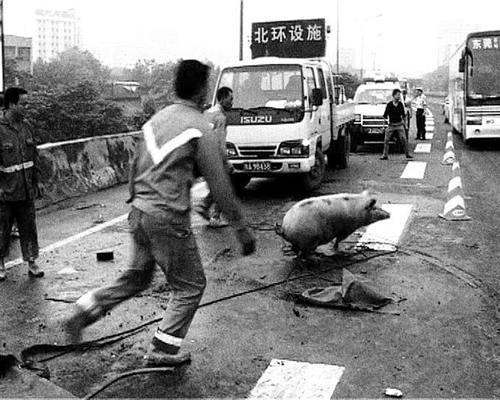
(image is from 黄伟凯 HUANG Wei Kai’s documentary Disorder)
There are things that can or should be controlled and other that can’t or shouldn’t or who cares?
Here is a topic that has been floating into my mind for a while, and that I’d like to start as a project. Ideally it would be great to have feedbacks from cities all over the world, but let’s be modest for now and see how it works.
Recent rumors about demolition in Gulou made me think about the balance between order and disorder that shapes every city. The Gulou project is yet another proof that Beijing authorities want the city to be ordered. And commercial development is a way to achieve this. I do think that order is necessary to make things work, but isn’t too much order a way of ruining urban potential? Take Nanluoguxiang: at the beginning it was an interesting initiative, because the general process of ordering the city somehow created the conditions that allowed individual initiatives: Passby bar, and the followings. That street stayed for a couple of years in a subtle balance between order and disorder. But now it has clearly taken the way of (commercial) order, therefore killing individual’s initiative rather than creating new opportunities.
But what is order, and disorder? How is it defined, by whom and for which reasons?
I have chosen some quotes, coming from interviews or simple conversations, about the order/disorder couple:
- “In Beijing, you can encounter every kind of person, every kind of situation. In Western cities, everything is nice, you can’t see this mess. But it’s a creative mess.”
- “Sometimes, I really need to escape from Beijing. here everything is controlled. I like to go to smaller cities, there you can drink beer on the streets, everyone is outside eating chuan’r. I like that.” And a little later, in the same conversation, he told me in a very disregarding way that people in smaller cities aren’t civilized at all. But isn’t it part of the same process? It seems that in beijing, being civilized means not to eat chuan’r on the sidewalks.
- “London is very oppressive. I really don’t like it. It is supposed to be one of the most creative cities, but here everything is well planned, there are cameras and CCTV everywhere, there is no disorder, and I find it quite disturbing. Look at Tel Aviv, there is much more disorder, people don’t care that much.”
- “One of the things that I wanted to do, (but then the green revolution started, so I couldn’t), was to go around without head scarf and have friends film me. I don’t know how people would react. Maybe they would say something, disapprove. After more than 30 years of being ruled by religious law, people have integrated these values. But at the same time, women would be very happy to get rid of that scarf.” So people are negotiating their own being incoherent, between what you consider that should be ordered and what could be your own disorder.
I do think that every city has its own way of managing order/disorder. But I would be curious to explore these different ways of defining it and see also how they allow, or not, individuals to have initiatives. What kinds of order/disorder do we need to be stimulated, structure our urban life?
…to be continued

 时间 posted on: 29 July 2010 |
时间 posted on: 29 July 2010 |  发布者 author:
发布者 author: 
 分类 filed under:
分类 filed under:
August 1st, 2010 - 23:33
—The Parasite, Michel Serres